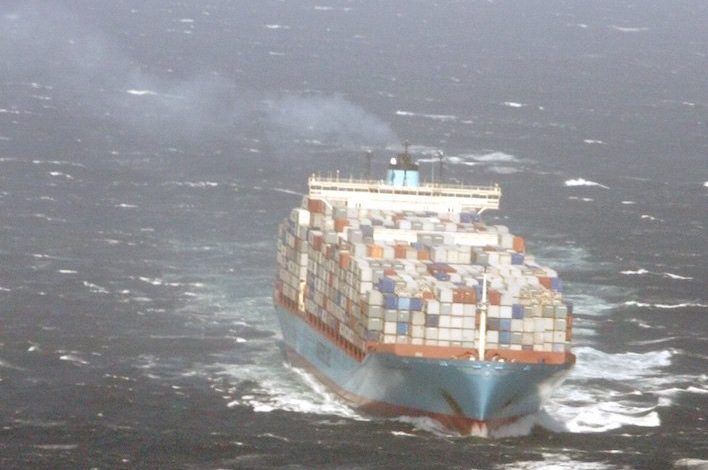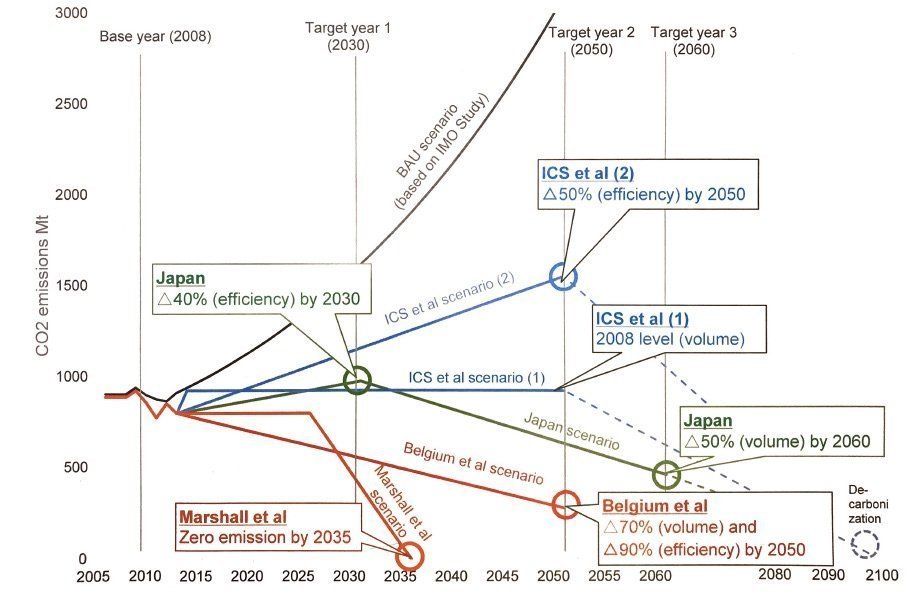ICS lashes out at ‘unrealistic’ Marshall Islands emission cut proposals

The huge divergence on shipping’s CO2 emission promises spilled out onto social media this morning as the chief lobbyist for shipowners lashed out at one of the nations seeking the greatest and quickest emission targets.
The International Chamber of Shipping (ICS), which is representing the world’s national shipowners’ associations and over 80% of the world merchant fleet at the United Nations Climate Change Conference (COP 23) in Bonn this week, took to Twitter today to decry one its chief critics in the increasingly fierce environmental debate surrounding the future of shipping.
ICS said the “inflexible” and “unrealistic stance” of the Marshall Islands, both at the International Maritime Organization and in Bonn, risks consensus address shipping’s stance on CO2.
No. The inflexible & unrealistic stance of Marshall Islands – both at IMO and in Bonn – risks impeding consensus to address shipping's CO2 https://t.co/rjjlTDM1tt
— International Chamber of Shipping (ICS) (@shippingics) November 8, 2017
The Marshall Islands has led a clutch of Pacific island nations that are in danger of disappearing off the map thanks to rising seas in calling for the most aggressive shipping emission cuts. ICS, however, said today that a 100% cut in shipping emissions by 2035 – as called for by the Marshall Islands – is “not possible”.
Just MI statement on shipping. You heard ICS statement yesterday on need for ambitious IMO objectives, but 100% cut by 2035 not possible https://t.co/aF3qHBDuPa
— International Chamber of Shipping (ICS) (@shippingics) November 8, 2017
The chamber’s director of policy, Simon Bennett explained earlier this week: “ICS has a vision of zero CO2 emissions from shipping in the second half of the century. We are confident this will be achievable with alternative fuels and new propulsion technologies.”
Bennett went on to add that the chamber was falling in line with emission cut proposals put forward by Japan.
“Japan has set out in detail to IMO how a 50% total cut by 2060 might be achieved. In view of projections for future trade growth, an objective in this range, while still incredibly ambitious, therefore seems more realistic,” Bennett said.
Whatever is decided, ICS believes that the entire world fleet is unlikely to enjoy global access to new alternative fuels for at least another 20 or 30 years.
An environmental gathering held at the International Maritime Organization (IMO) headquarters last month showed the difficulties the industry faces in reaching consensus on CO2 cuts ahead of the important next meeting of the Marine Environment Protection Committee (MEPC) in April next year.
Nevertheless, the ICS remains confident the UN body can lead shipping to a suitable CO2 agreement in the coming months.
“[W]e are very confident of IMO success. Most States including EU nations and big economies like China India & Brazil are very constructive,” ICS stated in a later Tweet today.


DA MIHI CASTITATEM ET CONTINENTIAM SED NOLI MODO, as Saint Augustine of Hippo remarked.
If Simon Bennett were based in Funafuti, home of many fine seamen, and not London, he might be better able to see the point.
The best thing would be to go for the hardest impossible/possible and get going instead of debating. All models are and will be wrong but some will be more useful than others. In the big picture we have to remember that everyone involved will adjust to the same challenges and cost. The faster, cleaner and leaner the better in the long run. Who will even remember this discussion 1 year from now? Life and Shipping goes on and we will for sure have other hot topics to argue about during the coming 30-50 years…
Well said, Jan!
I could not agree more.
Why don’t we just get on with it? Given a lead time of seventeen years, there is no reason for anyone who is involved in the industry today to lose money.
As you say, the faster, cleaner and leaner in the long run.
Bravo to the Marshall Island’s leadership. On point – If the owners from Greece, China, Singapore, Japan, Korea and Germany had their families and homes under immediate threat from sea level rise would they be stalling. The good news is We all can trust the IMO and ICS to do what they have always done, Kick the can down the road. Leadership – a compelling vision communicated clearly with attainable goals congratulations and well done to the Marshall Islands leadership.
I second that.
Sadly, our “industry spokesmen” sincerely believe that their job is to kick the can down the road.
We are seeing an effort to “rubbish” the Marshall Islands’ proposal. The arrogance and condescension of this tweet from the International Chamber of Shippng simply beggars belief:
No. The inflexible & unrealistic stance of Marshall Islands – both at IMO and in Bonn – risks impeding consensus to address shipping’s CO2
The ICS want to move towards zero emissions in the second half of this century.
Let’s just remind the ICS that in 1917, diesel ships were almost unknown and there were still cargo carrying sailing ships. Nobody had any idea what the second half of that century would look like.
. The ICS is not “being realistic”; it is attempting to push back the hands of the clock.
Yes, consensus is desirable. So how about the ICS showing some leadership, just for once, and moving forward to the Marshall Islands’ position?
It has been said by an industry leader that we should;
“Take care of today, actively prepare for tomorrow.
What it means as a core value:
Forward thinking, planning and execution
Being informed, innovative and seeking out new ideas
Looking for changes in the environment.”
This takes commitment, as the same industry leader points out;
“We are committed to reducing the environmental impact of our operations. We work continually to reduce emissions; dispose of resources responsibly; mitigate pollution and the depletion of natural resources; and prevent our vessels from damaging the marine environment.”
As long as the majority of shipowners agree, what could possibly go wrong?
notwithstanding the provocative tone of ICS’ tweets:
who’s got a problem with the kick the can strategy? Central banks, commercial banks, governments, industries, my neighbors, people with mortgages, everyone is doing exactly that!
Dunno about the true contribution of shipping in global emissions and sea level increases, but then again who does? Marshal islands should also chase car drivers sitting at red lights revving their engines.
this is exactly like the coffee machine at the kitchenette of my office. Every colleague wants milk froth to come out when they press the button, but no one will take the time to replenish the milk. They just leave it spitting only steam, swearing at their bad luck. Don’t stare at it Iphone addicts! Do something about it or there will be a time when you won’t be able to enjoy that capuccino.
who is able to tell how much additional Co2 emissions resulted from the quantitative easing and negative interest rate policies of central banks or by the relaxation of bank reserve restrictions in China? These policies result in increased activity, so why not blame them also?
it is beyond reasonable doubt that the globe and the human species are in a seemingly irreversible path to non viability in the long run.
you know something? next time we wanna do something tangible for the environment, we should consider riding our bikes, survive with one pair of sneakers and so on.
Only then will Marshal islands and other territories remain afloat. And this revolution starts from everyone’s home.